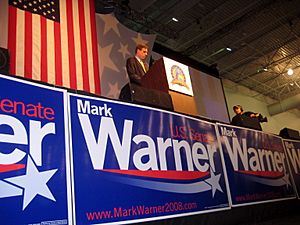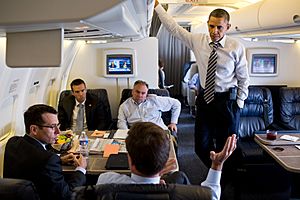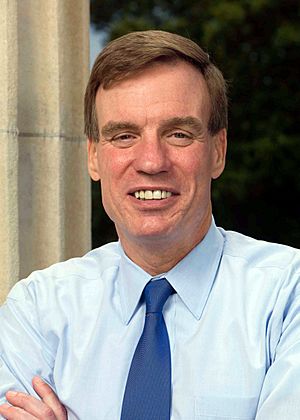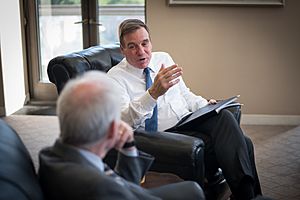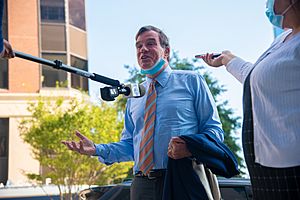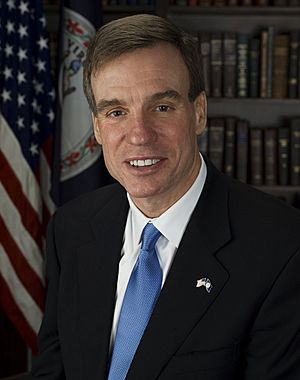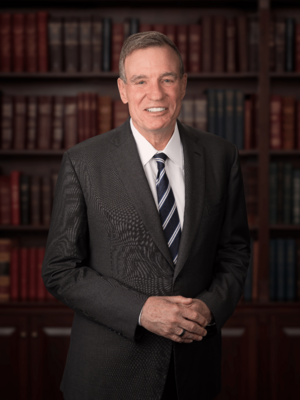Mark Warner facts for kids
Quick facts for kids
Mark Warner
|
|||||||||||||||||||||||||||||||||||||
|---|---|---|---|---|---|---|---|---|---|---|---|---|---|---|---|---|---|---|---|---|---|---|---|---|---|---|---|---|---|---|---|---|---|---|---|---|---|
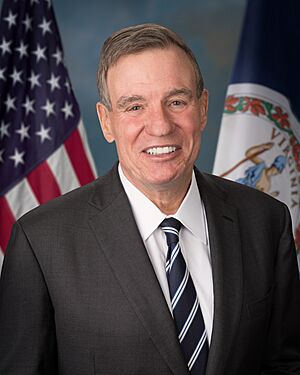
Official portrait, 2025
|
|||||||||||||||||||||||||||||||||||||
| United States Senator from Virginia |
|||||||||||||||||||||||||||||||||||||
| Assumed office January 3, 2009 Serving with Tim Kaine
|
|||||||||||||||||||||||||||||||||||||
| Preceded by | John Warner | ||||||||||||||||||||||||||||||||||||
|
|||||||||||||||||||||||||||||||||||||
| Chair of the National Governors Association | |||||||||||||||||||||||||||||||||||||
| In office July 20, 2004 – July 18, 2005 |
|||||||||||||||||||||||||||||||||||||
| Preceded by | Dirk Kempthorne | ||||||||||||||||||||||||||||||||||||
| Succeeded by | Mike Huckabee | ||||||||||||||||||||||||||||||||||||
| 69th Governor of Virginia | |||||||||||||||||||||||||||||||||||||
| In office January 12, 2002 – January 14, 2006 |
|||||||||||||||||||||||||||||||||||||
| Lieutenant | Tim Kaine | ||||||||||||||||||||||||||||||||||||
| Preceded by | Jim Gilmore | ||||||||||||||||||||||||||||||||||||
| Succeeded by | Tim Kaine | ||||||||||||||||||||||||||||||||||||
| Chair of the Democratic Party of Virginia | |||||||||||||||||||||||||||||||||||||
| In office May 4, 1993 – September 18, 1995 |
|||||||||||||||||||||||||||||||||||||
| Preceded by | Paul Goldman | ||||||||||||||||||||||||||||||||||||
| Succeeded by | Suzie Wrenn | ||||||||||||||||||||||||||||||||||||
| Personal details | |||||||||||||||||||||||||||||||||||||
| Born |
Mark Robert Warner
December 15, 1954 Indianapolis, Indiana, U.S. |
||||||||||||||||||||||||||||||||||||
| Political party | Democratic | ||||||||||||||||||||||||||||||||||||
| Spouse |
Lisa Collis
(m. 1989) |
||||||||||||||||||||||||||||||||||||
| Children | 3 | ||||||||||||||||||||||||||||||||||||
| Education | George Washington University (BA) Harvard University (JD) |
||||||||||||||||||||||||||||||||||||
| Signature | |||||||||||||||||||||||||||||||||||||
| Website | |||||||||||||||||||||||||||||||||||||
Mark Robert Warner (born December 15, 1954) is an American businessman and politician. He is currently a U.S. Senator for Virginia, a role he has held since 2009. Before becoming a senator, Warner was the 69th governor of Virginia from 2002 to 2006. He is a member of the Democratic Party.
Senator Warner holds important positions in the Senate. He is the vice chair of the Senate Democratic Caucus. He also serves as the vice chair of the Senate Intelligence Committee. This committee deals with important national security matters.
In 2006, many people thought Warner might run for president. However, he decided not to, saying he wanted to focus on his family. He later gave a main speech at the 2008 Democratic National Convention. He was also considered as a possible vice presidential candidate.
Warner was elected to the Senate in 2008. He was reelected in 2014 and 2020. He became Virginia's senior senator in 2013. Before entering politics, Warner worked in the telecommunications business. He helped start several technology companies. He is known for being one of the wealthiest members of Congress.
Early Life and Education
Mark Warner was born in Indianapolis, Indiana. His parents were Marjorie and Robert F. Warner. He has a younger sister named Lisa. He grew up in Illinois and then in Vernon, Connecticut. He graduated from Rockville High School.
Inspiration for Politics
Warner has said his eighth-grade social studies teacher, Jim Tyler, inspired him. This teacher encouraged him to work for social and political change. Warner was the class president in high school. He also hosted weekly basketball games at his house.
College and Early Work
Warner was the first in his family to go to college. He graduated from George Washington University (GWU) in 1977. He earned a bachelor's degree in political science. He was a top student, graduating with a perfect grade point average. While at GWU, he worked on Capitol Hill to pay for his studies. He rode his bike to the office of U.S. Senator Abraham Ribicoff.
During his sophomore year, Warner took time off from school. He worked as a youth coordinator for Ella Grasso's successful campaign for governor in Connecticut. After returning to Washington, he worked part-time for then-Representative Chris Dodd. He later managed Dodd's campaign for the Senate.
Law School and Career Start
Warner then attended Harvard Law School. He earned his law degree in 1980. He also coached the law school's first women's basketball team. After law school, he worked for the Democratic Party in Atlanta. Warner has never practiced law as a lawyer.
Early Career and Business
Before his political career, Warner started two businesses that were not successful. He then became a general contractor for cellular businesses and investors. He founded and managed Columbia Capital, a venture capital firm. This firm helped start or invested early in many technology companies, including Nextel.
He also co-founded Capital Cellular Corporation in 1989. He used his knowledge of federal telecommunications law to trade parts of cellular spectrum. Through these ventures, he built up a significant amount of wealth.
State Involvement
Warner became involved in public efforts in Virginia. He focused on areas like health care, transportation, and education. He managed Douglas Wilder's successful campaign for governor in 1989. He also served as the chairman of the state Democratic Party from 1993 to 1995. In the early 1990s, he was part of the Virginia Commonwealth Transportation Board.
1996 Senate Race
In 1996, Warner ran for the U.S. Senate. He ran against the Republican incumbent, John Warner (they are not related). Mark Warner did very well in rural areas of the state. This made the election much closer than many people expected. However, he lost to the incumbent.
Governor of Virginia
2001 Election
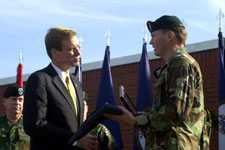
In 2001, Mark Warner ran for governor of Virginia. He ran as a moderate Democrat. He had spent years building support in rural Virginia. His opponents were Republican Mark Earley and Libertarian William B. Redpath. Warner won the election with 52.16 percent of the votes. He also had a lot more money for his campaign.
Time as Governor
When Warner became governor in 2002, he used a special fund of $900 million. This fund was left by the previous governor, Jim Gilmore. Warner had supported increasing sales taxes in some parts of Virginia to pay for transportation. However, voters rejected these tax increases.
In 2004, Warner worked with lawmakers from both parties. They changed the state's tax code. They lowered some taxes, like food and income taxes. They also increased sales and cigarette taxes. Warner said these changes helped the state's financial health. They also allowed for a large investment in K-12 education.
Impact on College Sports
As governor, Warner also had an impact on college sports. In 2003, he used his power to influence the Atlantic Coast Conference. He wanted them to add Virginia Tech to their group. He succeeded in getting Virginia Tech added.
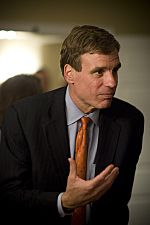
Warner's popularity helped Democrats gain seats in the Virginia House of Delegates. He chaired the National Governors Association from 2004 to 2005. He also led a national effort to improve high schools. In 2005, Virginia received high ratings for how well it was managed. This led Warner to call Virginia "the best managed state in the nation."
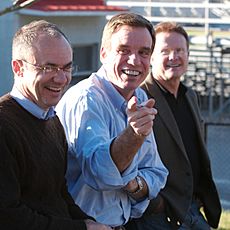
The Virginia Constitution does not allow a governor to serve two terms in a row. So, Warner could not run for reelection in 2005. He supported Tim Kaine, who was the Lieutenant Governor. Kaine won the election. Warner left office with high approval ratings from the public.
U.S. Senate
2008 Election
In 2007, Mark Warner announced he would run for the U.S. Senate. He was running for the seat being left by the retiring John Warner (no relation). Mark Warner quickly gained support from many Democrats. He was far ahead of his Republican opponent, Jim Gilmore, who was also a former Virginia governor.
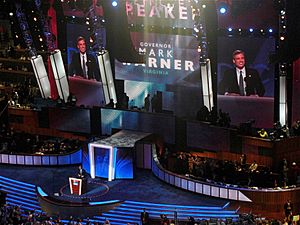
Warner gave the main speech at the 2008 Democratic National Convention. In the November election, Warner won against Gilmore with 65% of the votes. This was a very large victory. Virginia had two Democratic U.S. senators for the first time in many years.
Later Elections
In 2014, Warner ran for reelection. He won against Ed Gillespie, but the race was much closer than expected. In 2020, Warner was reelected again. He defeated Republican Daniel Gade with 56% of the vote.
Senate Work
When Warner joined the Senate in 2009, he was appointed to important committees. These included the Banking, Budget, and Commerce committees. In 2011, he was also named to the Senate Intelligence Committee.
In 2009, Warner voted for the American Recovery and Reinvestment Act. This was a bill to help the economy. He worked to make sure the government could track how the money was being spent.
In 2012, some people suggested Warner should leave the Senate to run for governor again. However, Warner decided to stay in the Senate. He said he wanted to find solutions to the country's financial problems. On January 3, 2013, Warner became Virginia's senior senator. This happened when Jim Webb left the Senate.
Warner is known for working with members of both political parties. He tries to find common ground and make compromises in the Senate. He has been recognized as one of the most bipartisan members of the U.S. Senate.
Committee Assignments
As of 2025, Senator Warner serves on several key committees:
- Committee on Banking, Housing, and Urban Affairs
- Committee on the Budget
- Committee on Finance
- Committee on Rules and Administration
- Select Committee on Intelligence (where he is the Vice Chairman)
- Joint Committee on the Library
Political Views
Health Care
Warner voted for the 2010 Affordable Care Act (ACA), also known as Obamacare. He helped the bill pass in the Senate. He also worked to add changes to the bill to help control health care costs.
Economy and Finance
Warner has worked to improve the country's financial health. He worked with a Republican senator, Bob Corker, on a part of the Dodd-Frank Act. This act aims to prevent taxpayers from having to bail out large financial companies. They received an award for their bipartisan work on financial reform.
In 2018, Warner supported a bill to make some banking rules less strict. He believed it would help smaller banks lend money more easily.
Foreign Affairs and Security
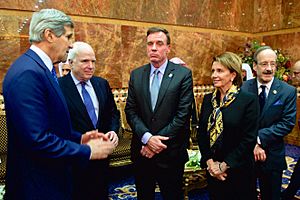
Warner has spoken about international issues. In 2015, he criticized some of the bombing in Yemen. In 2017, he voted to support a large arms deal with Saudi Arabia.
In 2016, Warner signed a letter urging President Obama to veto resolutions against Israel. In 2017, he criticized a decision to recognize Jerusalem as the capital of Israel. He said it could make the region more unstable. In 2017, he voted for sanctions against Iran, Russia, and North Korea.
Technology and Security
In 2018, Warner said that the Chinese company Huawei was a threat to U.S. national security. In 2019, he signed a letter urging action to protect the country's electricity infrastructure from cyber threats. He also supported a bill to prevent Huawei from being easily removed from a list of companies that pose a security risk.
In 2025, Warner co-sponsored the Kids Off Social Media Act (KOSMA). This bill would set a minimum age of 13 to use social media platforms. It would also stop social media companies from showing "algorithmically targeted" content to users under 17.
Defense
In 2011, Warner voted to extend the USA PATRIOT Act. He also worked to fix problems at Arlington National Cemetery. He pushed the Navy to improve housing for military families in Virginia. He also worked to help federal workers get their retirement benefits faster. He helped expand access to PTSD treatment for female military veterans.
Warner received the Navy Distinguished Public Service Award. This is the Navy's highest honor for a civilian. It was given for his support of military families and veterans in Virginia.
Gun Laws
In 2013, Warner voted to expand background checks for gun purchases. He also voted against a ban on certain assault weapons at that time. However, in 2018, he changed his position and has supported similar bans since then. In 2019, he supported a bill to require background checks for all firearm sales.
LGBT Issues
Warner supports same-sex marriage. He announced his support in 2013. In 2015, he co-sponsored the Equality Act. This bill aims to prevent discrimination in areas like housing, education, and the workplace.
Minimum Wage
In 2014, the Senate discussed raising the federal minimum wage to $10.10 per hour. Warner said he was willing to work with Republicans on the bill. He believed any increase should be done "in a responsible way."
Government Transparency
In 2009, Warner chaired a group focused on government performance. He helped create the 2010 Government Performance and Results Act (GPRA). This act set goals for federal agencies and made their performance reviews more open.
In 2013, Warner introduced the Digital Accountability and Transparency Act of 2014 (DATA). This law requires federal spending information to be posted online in a clear way. This helps citizens track spending and helps identify waste. The bill passed in both the Senate and the House of Representatives.
Personal Life
Mark Warner is married to Lisa Collis. They have three daughters. In 1989, Warner became very ill during his honeymoon. Doctors found he had a nearly fatal burst appendix. He spent two months recovering in the hospital.
Warner is also involved in farming and winemaking. He grows grapes on his farm in Virginia. These grapes are used to make wine for a local vineyard.
He is not related to John Warner, who was his predecessor in the Senate.
Honorary Degrees
Mark Warner has received several honorary degrees from different universities:
| Location | Date | School | Degree |
|---|---|---|---|
| 2002 | College of William and Mary | Doctor of Laws (LL.D) | |
| 2003 | George Washington University | Doctor of Public Service (DPS) | |
| May 15, 2006 | Wake Forest University | Doctor of Laws (LL.D) | |
| 2007 | Lord Fairfax Community College | Associate of Humane Letters | |
| May 20, 2007 | Eastern Virginia Medical School | Doctorate | |
| May 25, 2013 | George Mason University | Doctorate | |
| May 19, 2018 | Virginia State University | Doctorate | |
| May 18, 2024 | Virginia Wesleyan University | Doctor of Laws |
See also
 In Spanish: Mark Warner para niños
In Spanish: Mark Warner para niños
 | Anna J. Cooper |
 | Mary McLeod Bethune |
 | Lillie Mae Bradford |


